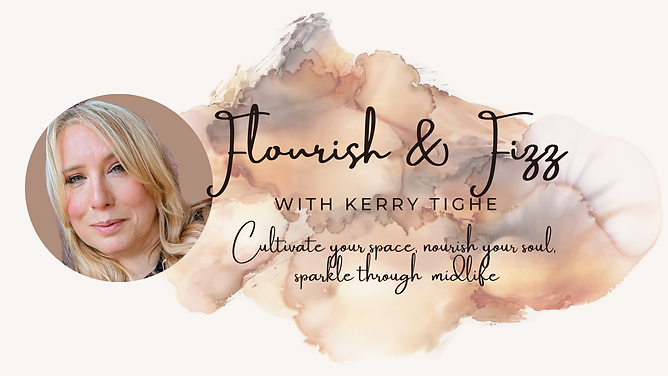Navigating Menopause: Wellness and Wellbeing Strategies
- Kerry

- Oct 3, 2025
- 4 min read
Updated: Oct 5, 2025
As a Menopause Ambassador and someone going through this, I wanted to touch upon some of the topics on this subject. Menopause is a natural phase in a woman's life, yet it can feel overwhelming and debilitating for some. Many of us experience a range of symptoms that can disrupt daily life. From hot flashes to mood swings, the changes can be challenging. However, understanding menopause and adopting effective wellness strategies can make this transition smoother.
In this post, we will explore various approaches to enhance wellbeing during menopause. We will cover lifestyle changes, dietary adjustments, and mental health strategies. We will talk more about this in my vlogs so please do follow me.
Understanding Menopause
Menopause marks the end of a woman's reproductive years. It typically occurs between the ages of 45 and 55. During this time, the body undergoes hormonal changes, leading to the cessation of menstruation.
Common symptoms include:
Hot flashes
Night sweats
Mood changes
Sleep disturbances
Weight gain
These symptoms can vary in intensity and duration. Some women may experience mild discomfort, while others may find it significantly impacts their quality of life.
Recognising these changes is the first step toward managing them effectively.
Embracing a Healthy Lifestyle
Adopting a healthy lifestyle can significantly alleviate menopause symptoms. Here are some key areas to focus on:
Regular Exercise
Physical activity is crucial during menopause. It helps manage weight, boosts mood, and improves sleep quality. Aim for at least 150 minutes of moderate aerobic activity each week.
Types of exercise to consider:
Walking: A simple and effective way to stay active.
Yoga: Helps with flexibility and relaxation.
Strength training: Builds muscle mass and supports metabolism.
Incorporating a mix of these activities can provide both physical and mental benefits.

Balanced Diet
Scientists have stated that nutrition plays a vital role in managing menopause symptoms. A balanced diet can help maintain energy levels and support overall health.
Key dietary tips include:
Increase calcium and vitamin D: These nutrients support bone health. Include dairy products, leafy greens, and fortified foods in your diet.
Stay hydrated: Drink plenty of water to help with hot flashes and overall wellbeing.
Limit caffeine and alcohol: Both can exacerbate symptoms like hot flashes and sleep disturbances.
Consider keeping a food diary to track what works best for your body.

Prioritising Mental Health
Menopause can bring emotional challenges. It's essential to prioritise mental health during this time. Here are some strategies to consider:
Mindfulness and Meditation
Practicing mindfulness can help reduce stress and improve emotional wellbeing. Simple techniques include:
Deep breathing exercises: Take a few minutes each day to focus on your breath.
Guided meditation: Use apps or online resources to find guided sessions that resonate with you.
Journaling: Take some time each day to journal and spend time with your your thoughts.
These practices can help you feel more grounded and centred.

Seek Support
Connecting with others can provide comfort and understanding. Consider joining a support group or talking to friends who are going through similar experiences. Join me on my social media and connect with the community.
Benefits of support include:
Sharing experiences and coping strategies
Reducing feelings of isolation
Gaining new perspectives on challenges
Don't hesitate to reach out for professional help if needed. A therapist can provide valuable tools for managing emotional changes.
Exploring Alternative Therapies
Many women find relief from menopause symptoms through alternative therapies. While these may not work for everyone, they can be worth exploring.
Herbal Remedies
Some herbs are believed to help with menopause symptoms. Common options include:
Black cohosh: Often used to reduce hot flashes.
Red clover: May help with mood swings and sleep disturbances.
Always consult with a healthcare provider before starting any new supplements.
Acupuncture
Acupuncture is another alternative therapy that some women find beneficial. It may help reduce hot flashes and improve sleep quality.
Consider seeking a licensed acupuncturist who has experience with menopause-related issues.
Building a Supportive Environment
Creating a supportive environment at home and work can enhance your wellbeing during menopause. Here are some ideas:
Communicate Openly
Talk to your family and friends about what you are experiencing. Open communication can foster understanding and support.
Adjust Your Workspace
If possible, make adjustments to your workspace to enhance comfort. This could include:
Using a fan to stay cool
Taking regular breaks to stretch and move
Small changes can make a big difference in how you feel throughout the day.
Staying Informed
Knowledge is power. Staying informed about menopause can help you make better decisions regarding your health.
Read and Research
Consider reading books or articles about menopause. Look for reputable sources that provide evidence-based information.
Embracing the Journey
Menopause is a significant life transition, but it can also be a time of growth and self-discovery. Embracing this journey with a positive mindset can lead to new opportunities.
Focus on Self-Care
Make self-care a priority. This could include:
Taking time for hobbies you enjoy
Scheduling regular relaxation time
Practicing gratitude daily
Self-care is not selfish; it is essential for your overall wellbeing.

Celebrate Your Strength
Recognise the strength you have gained through your experiences. Menopause is a natural part of life, and embracing it can lead to empowerment.
Conclusion: A New Chapter Awaits
Navigating menopause can be challenging, but it is also an opportunity for growth and renewal. By adopting wellness strategies, prioritising mental health, and seeking support, you can enhance your wellbeing during this transition.
Remember, you are not alone in this journey. Many women share similar experiences, and together, we can support one another. Embrace this new chapter with confidence and grace. Join me on my social media and lets support each other and build a community.




Comments